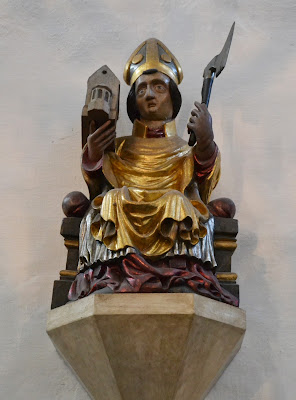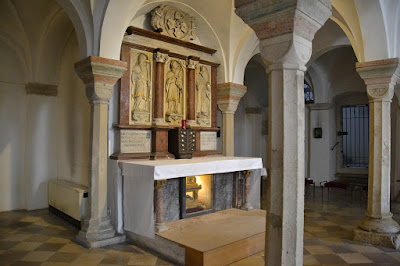St Wolfgang of Regensburg
Traditionally, the vigil of All Saints was kept in much of Germany as the feast of St Wolfgang, who died on October 31st of the year 994. Our thanks to our friend Jordan Hainsey for providing us with this brief article, as well as the photos, and the recording of an antiphon from the Office of St Wolfgang used at Regensburg, given below.Saint Wolfgang (934-994) was born in Swabia, a region in the southwest of Germany, and studied at the Benedictine Abbey of Reichenau before taking up studies in Würzburg, where he became a teacher at the cathedral school of Trier. His ascetic tendencies led him to join the Benedictines at Einsiedeln, Switzerland, where he was appointed head of the monastery school. Wolfgang was ordained in 968 by St Ulrich, who sent him with a party of monks to preach to the Magyars of Hungary, whose resistance to the faith was a threat to the Empire. In 972, the Emperor Otto II appointed him Bishop of Regensburg; he immediately initiated a reform of the clergy and religious life, preached with vigor and effectiveness, and demonstrated special concern for the poor. As his life drew to a close, Wolfgang became a hermit. He retreated to the Salzkammergut region of Austria, where he dwelt in caves wearing his episcopal ring and carrying his crozier. Inspired to build the first church there, he threw his axe and vowed to build a church on the spot it landed. Three days later he found the axe and built the church on the rocky hill next to the lake, today know as Wolfgangsee. His time as an ascetic life was cut short however; he was so beloved by the Regensburg people that they came and carried him back to be their bishop again. In 994, while traveling in Austria, Wolfgang became sick and died in the village of Pupping. Miracles associated with his tomb, including many healings, led to his canonization in 1052. Several of St Wolfgang’s devotees experienced relief from stomach ailments, and he remains a patron saint of such troubles today. St Wolfgang with his axeHistory of the Office of Saint WolfgangMuch of the excellent historical research on the early Offices of Regensburg’s Saints, including that of Saint Wolfgang, has been undertaken by Dr David Hiley, an accomplished scholar in music history and theory, who serves as a professor at Universität Regensburg. The earliest extant copy of the Office of St Wolfgang is found in a 15th century manuscript from St Emmeram’s Monastery in Regensburg. During St Wolfgang’s episcopate, there was a renaissance in the production of liturgical manuscripts and music books in Regensburg, including a famous gradual now in the Bamberg Staatsbibliothek.In the 11th century, St Wolfgang’s remains were translated to a new crypt in St Emmeram (both pictured below), and it is likely that a new vita and liturgical Office were composed for this occasion. The author is likely Otloh, a monk of St. Emmeram who was a prolific writer of Saints’ lives, and a music theorist. Musicologists have also speculated that it may have been composed by a student of Otloh’s at St Emmeram, William of Hirsau, or a monk from the Abbey of Reichenau where Wolfgang studied.
St Wolfgang with his axeHistory of the Office of Saint WolfgangMuch of the excellent historical research on the early Offices of Regensburg’s Saints, including that of Saint Wolfgang, has been undertaken by Dr David Hiley, an accomplished scholar in music history and theory, who serves as a professor at Universität Regensburg. The earliest extant copy of the Office of St Wolfgang is found in a 15th century manuscript from St Emmeram’s Monastery in Regensburg. During St Wolfgang’s episcopate, there was a renaissance in the production of liturgical manuscripts and music books in Regensburg, including a famous gradual now in the Bamberg Staatsbibliothek.In the 11th century, St Wolfgang’s remains were translated to a new crypt in St Emmeram (both pictured below), and it is likely that a new vita and liturgical Office were composed for this occasion. The author is likely Otloh, a monk of St. Emmeram who was a prolific writer of Saints’ lives, and a music theorist. Musicologists have also speculated that it may have been composed by a student of Otloh’s at St Emmeram, William of Hirsau, or a monk from the Abbey of Reichenau where Wolfgang studied.
 Arranged in modal order, the Office’s melody employs a Gallican cadence, the liturgical plainchant of the Gallican rite of the Roman Church prior to the advent of Gregorian chant. While the antiphon adheres to a clear tonal structure, it expresses an extraordinary freedom of movement, with quick leaps from one scale segment to another, scale passages through them, and even oscillations.Antiphon - Office of Saint Wolfgangfor the Magnificat at First VespersGaudeat tota virgo mater ecclesia, egregii presulis Vuolfgangi meritis insignibus iocundata; letetur foelix Sueuia, tam suaui prole fecundata. Exulta precipue ciuitas Ratispona, tanti pontificis tui doctrina patrociniis et corpore sacro gloriosa. Cuius sacratissimum votis omnibus recolentes transitum, ejus pium apud dominum deum nostrum iugiter sentire mereamur suffragium.Let the whole Church, our virgin mother, rejoice, delighted by the distinguished merits of the excellent Bishop Wolfgang; let happy Swabia be joyful, made fruitful by so sweet an offspring. Exult especially, o city of Regensburg, made glorious by the teaching of so great a man, your bishop, by his patronage, and by his sacred body. Commemorating his most holy death in all our prayers, may we always merit to experience his holy assistance before the Lord, our God.
Arranged in modal order, the Office’s melody employs a Gallican cadence, the liturgical plainchant of the Gallican rite of the Roman Church prior to the advent of Gregorian chant. While the antiphon adheres to a clear tonal structure, it expresses an extraordinary freedom of movement, with quick leaps from one scale segment to another, scale passages through them, and even oscillations.Antiphon - Office of Saint Wolfgangfor the Magnificat at First VespersGaudeat tota virgo mater ecclesia, egregii presulis Vuolfgangi meritis insignibus iocundata; letetur foelix Sueuia, tam suaui prole fecundata. Exulta precipue ciuitas Ratispona, tanti pontificis tui doctrina patrociniis et corpore sacro gloriosa. Cuius sacratissimum votis omnibus recolentes transitum, ejus pium apud dominum deum nostrum iugiter sentire mereamur suffragium.Let the whole Church, our virgin mother, rejoice, delighted by the distinguished merits of the excellent Bishop Wolfgang; let happy Swabia be joyful, made fruitful by so sweet an offspring. Exult especially, o city of Regensburg, made glorious by the teaching of so great a man, your bishop, by his patronage, and by his sacred body. Commemorating his most holy death in all our prayers, may we always merit to experience his holy assistance before the Lord, our God.

